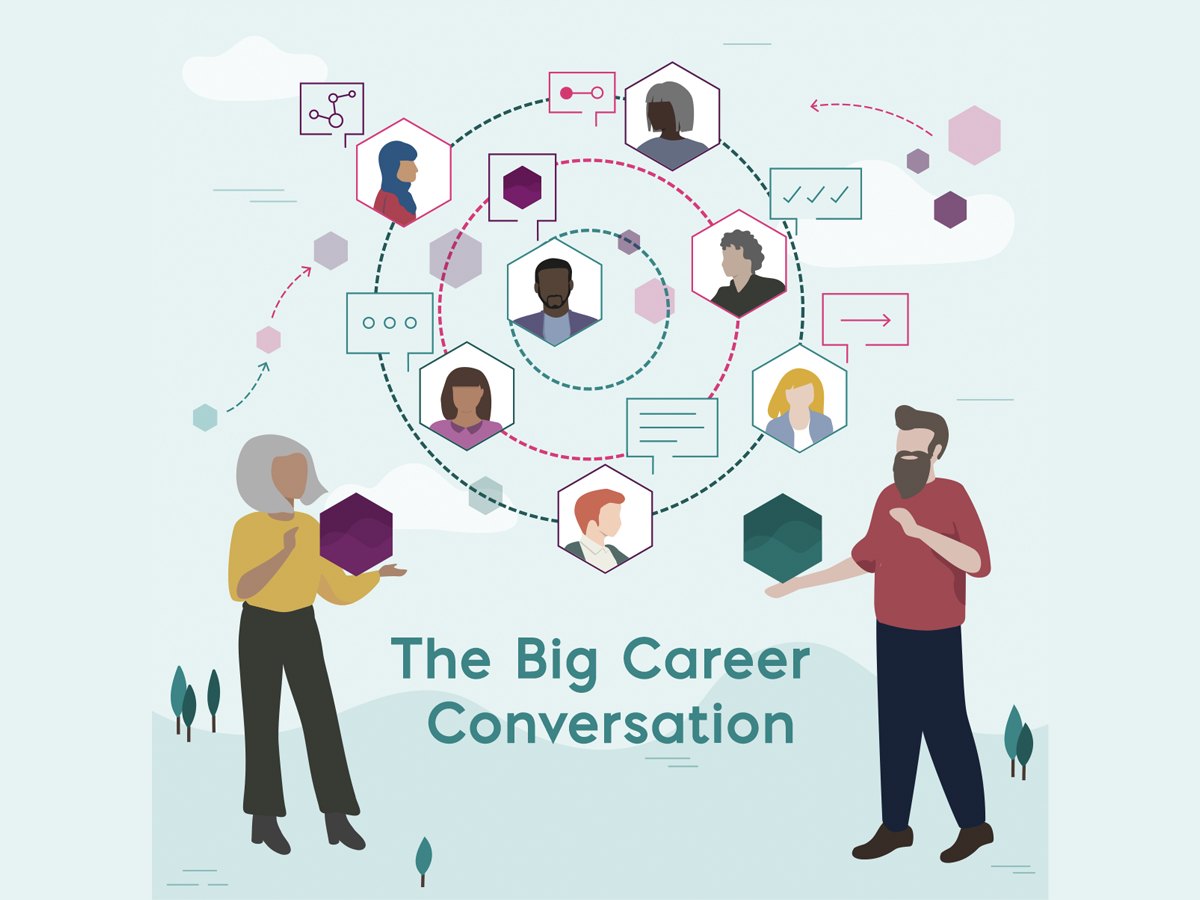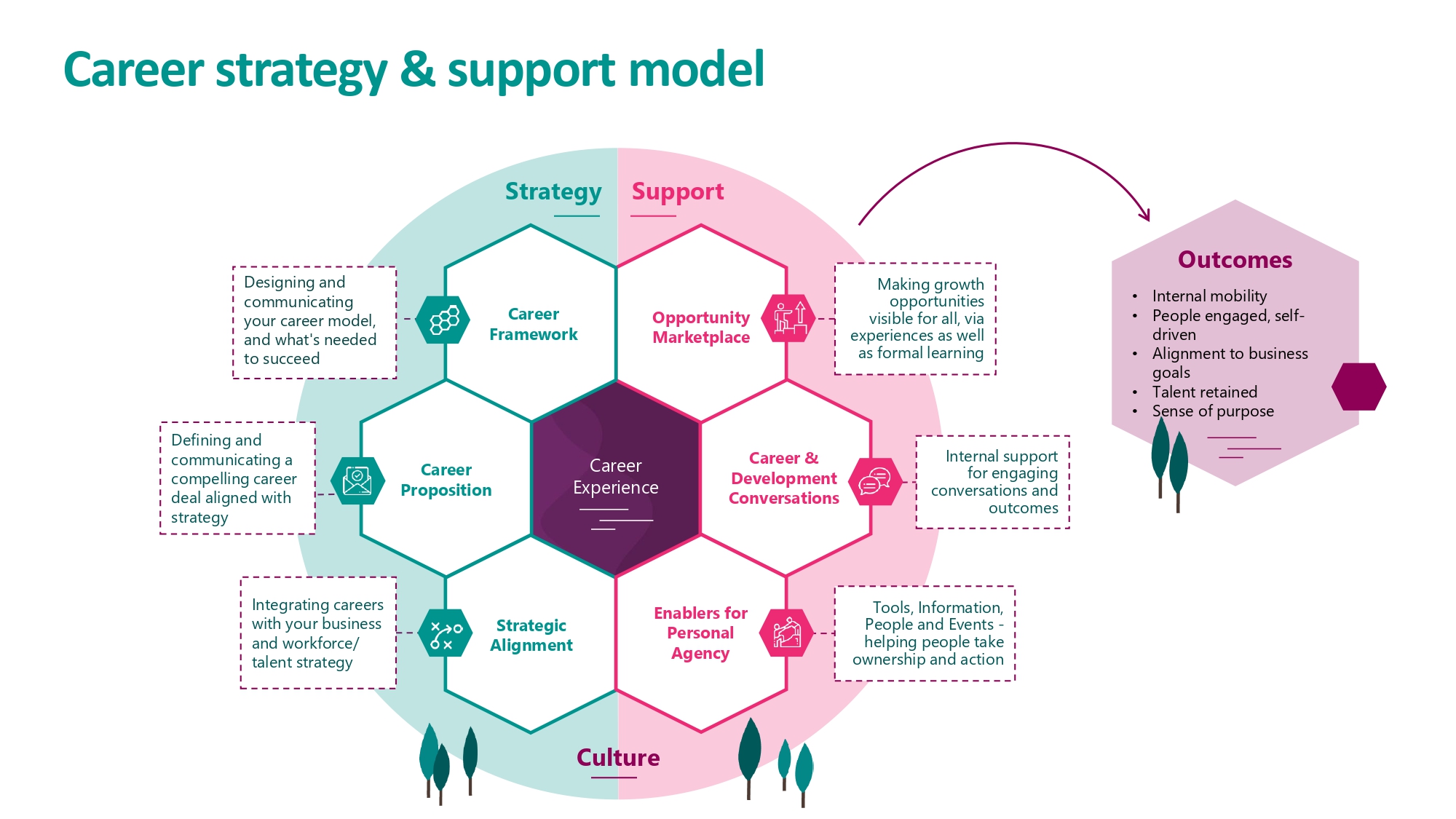The Opportunity
Ground-breaking trends have usually been around for some time before a disruptive event propels them centre-stage – and they are accepted as part of the new way of doing things. Laura Walker shone a light on this this during our Big Career Conversation week – it’s clear that the pandemic has sped up the acceptance of remote working, eLearning, and virtual meetings. But could the same be true for the way we think about the future shape of work and careers?
Reflecting on our week-long series of conversations I believe a strong case can be made for this. The traditional career has been in decline for decades, despite the desire of many to hang-on to the security and predictability it appeared to offer. The old ‘psychological contract’ between employer and employee no longer applies in an age of zero-hours working and the gig economy. Increasing numbers of business commentators have highlighted the need for employee career resilience. Organisations need to partner with their people to develop the agility and skills required to succeed in a fast-changing, digital environment.
In 2019, our Careers of Tomorrow research outlined the developments transforming the nature of jobs and careers. The impact of technological innovation, and particularly AI were prominent. One of our provocateurs, Ross Smith, claimed that the pandemic has advanced these trends by about 5 years.
Another significant trend was the growing pressure created by talent shortages, as declining working populations in developed countries lead to shortfalls in key skills. We found that new generations of career entrants have high expectations of the development support they will receive from their employer. Many yearn for a more inclusive work environment, where they feel encouraged and ‘at home’ as they seek to build their careers. We know from our consulting and coaching experience that many employees have used the disruption of the pandemic as an opportunity to think about their futures and to consider how and where they will find meaning in their work going forward.
The way forward is clear
It’s from this turbulent context that organisations have the opportunity to engineer a big re-set of their career strategy. To change how they deliver the employee ‘career experience’ that forms the central part of it.
We’re able to make a step-change in our approach to career development because we know exactly how to bring this about. It’s not a secret; just as with remote working and eLearning, the benefits and awareness of best practice have been understood for many years. It’s simply that previous efforts haven’t been sufficiently integrated or sustained. The academic, consultant and practitioner contributors to our Big Career Conversations summarised what we need to do to convert the careers of the future rhetoric into reality:
- Key metrics – Gather data on attrition rates, external recruitment costs, internal mobility, engagement and productivity levels, and demographics. Then, identify ‘the nuggets of evidence’ that create a compelling business case for investing in a skill and career-building strategy in your organisation
- Strategy– adopt a strategic, rather than tactical approach; be clear about your purpose, the business case, and the priority areas to address if career development is to be supported in practice
- A persuasive narrative – drawn from your business case, and spotlighting the future of skills and careers in your organisation. Share it with senior leaders, managers and employees. Engage them in conversations about what it will take to succeed; as my colleague Diane Tomlinson says:
“Shifting career strategy is 20% policy and process, and 80% conversations”
- Take a systemic view – ensure all related people policies and systems pull in the same direction. Explore and resolve tensions with other HR disciplines. particularly strategic workforce planning, talent management, performance management and reward
- A partnership – view career building as a partnership between the organisation, manager and employee. Equip everyone with the skills, information and resources they need to play their parts
- Be open – about the future of careers and career progression in the organisation. Highlight the individual’s role in navigating their own career, and prepare them to execute this responsibility.
- Insights – take the time to gain understanding of the current state of careers and talent development in your organisation. Honestly appraise your culture. What must change to deliver the career experience you envision for your employees?
- Experiment – learn from pilot tests before rolling out an approach across the whole organisation.
- Explore the use of technology platforms to facilitate opportunity marketplaces; a key priority if your career deal creates expectations of diverse projects and potential moves across the organisation
- Commit to making the best use of the talent and skills you already have in your organisation
Seize the moment
I’m convinced we’re in a moment of opportunity for a big career strategy re-set, and that the road map for implementing this already exists. What else is needed? The simple answer is you. None of this will happen without an individual providing committed and skilful leadership. This is why it hasn’t happened already. One reason for arranging The Big Career Conversation was to offer this call to action to HR leaders. Another is our belief that societies, organisations and each of us benefits when everybody is engaged in work that is rewarding, productive and a good fit with their skills and interests.
Leading this initiative will require courage, patience, and a clear sense of purpose. To convince sceptical colleagues, you’ll need to put your heart into it, as well as your best thinking. Before you begin this journey you’ll need to consider these questions; what am I passionate about, and what do I want my legacy to be? Once you have the answers, the rest is in your hands.





